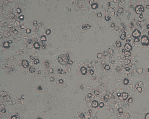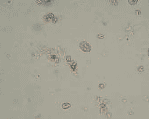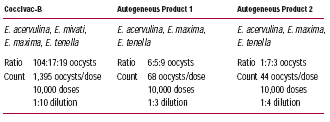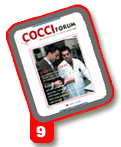Vaccine Showdown
Autogenus vaccines put to test against federally licensed industry leader
Most large integrators in the United States use a federally licensed vaccine for at least a
part of their total coccidiosis-management program. Along with this trend has come experimentation with autogenous alternatives, even though they are not USDA-licensed or subject to the same manufacturing standards.
How do autogenous vaccines stack up against the industry leader, Coccivac-B? Investigations were conducted to compare bacterial concentrations, debris, variable oocyst counts
and cost per dose.
"We have explained to producers the potential hazards of using an unlicensed vaccine, and now we have data that substantiates our message," says Dr. Rick Phillips, director of worldwide poultry technical services for Schering-Plough Animal Health Corporation.
Following are the results:>
Bacterial concentrations
University of Delaware's Lasher Laboratory compared bacterial concentrations in an autogenous coccidiosis vaccine called Product 1 for the purpose of this study and Coccivac-B. The autogenous vaccine was positive for Clostridium spp. and contained 5 million per mL of Enterobacter 1spp. In contrast, the Coccivac-B sample tested negative.
There is clearly a risk of viable and potentially pathogenic contaminants in this autogenous preparation, says Phillips.

Autogenous
Product 1 |

Coccivac-B |
Figure 1. Debris in the autogenous product
(top) is characterized by angular particles
obscuring oocysts; particulate debris in
Coccivac-B is minimal. |
|
Debris
A microscopic comparison of autogenous vaccine Product 1 and Coccivac-B was conducted by Dr. Steve Fitz-Coy, a
coccidiosis expert with Schering-Plough Animal Health. The autogenous vaccine contained debris, but Coccivac-B contained little (Figure 1).
Particulate matter in the autogenous preparation can clog spray nozzles, causing costly
disruption of hatchery efficiency, Phillips says.
Variable oocyst counts
The number of viable sporulated oocysts in two autogenous vaccines and Coccivac-B also were determined by Fitz-Coy. In autogenous Product 1 and Product 2, there were fewer and inconsistent numbers of oocysts per dose compared to Coccivac-B (Table 1).
 Table 1. Oocyst ratios and counts in autogenous products and Coccivac-B. |
 Table 2: Out-of-pocket price and effective dose/cost comparison between
Coccivac-B vaccine and autogenous products. |
"Fewer and inconsistent numbers of oocysts per dose can potentially result in slow, uneven development of immunity due to uncontrolled or partial oocyst dosing," Phillips explains. "This in turn can result in clinical coccidiosis in some birds or cause birds to undergo coccidial cycling during the peak of broiler growth, which hurts performance."
In contrast, the effective dose of sporulated oocysts required to develop dependable immunity has been extensively researched for Coccivac-B and is carefully controlled during vaccine manufacturing, he says.
In addition, oocysts in Coccivac-B were isolated before the introduction of most modern anticoccidials and are sensitive to current anticoccidials. The vaccine will dilute resistant oocyst populations with sensitive vaccine strains over time, he says
"True autogenous vaccines are produced from the native field strains. They will have the same resistance profile as wild strains and will not be able to dilute field resistance patterns," Phillips says.
Higher cost per dose
A cost comparison between the two autogenous vaccines and a federally licensed product showed that the actual effective dose price, as measured by cost per 1,000 oocysts, is less for Coccivac-B.
Using the example of a $1 base price for Coccivac-B with proportional prices assigned to autogenous Products 1 and 2, the actual cost per 1,000 oocysts of the autogenous product is 10 times higher than that of Coccivac-B.
"Superficial cost comparisons based on initial out-of-pocket expenses can be misleading," Phillips comments.
"These studies show that for producers concerned about safety, quality and cost effectiveness, a licensed coccidiosis vaccine is the best choice," he says.
Source: CocciForum Issue No.9, Schering-Plough Animal Health.







